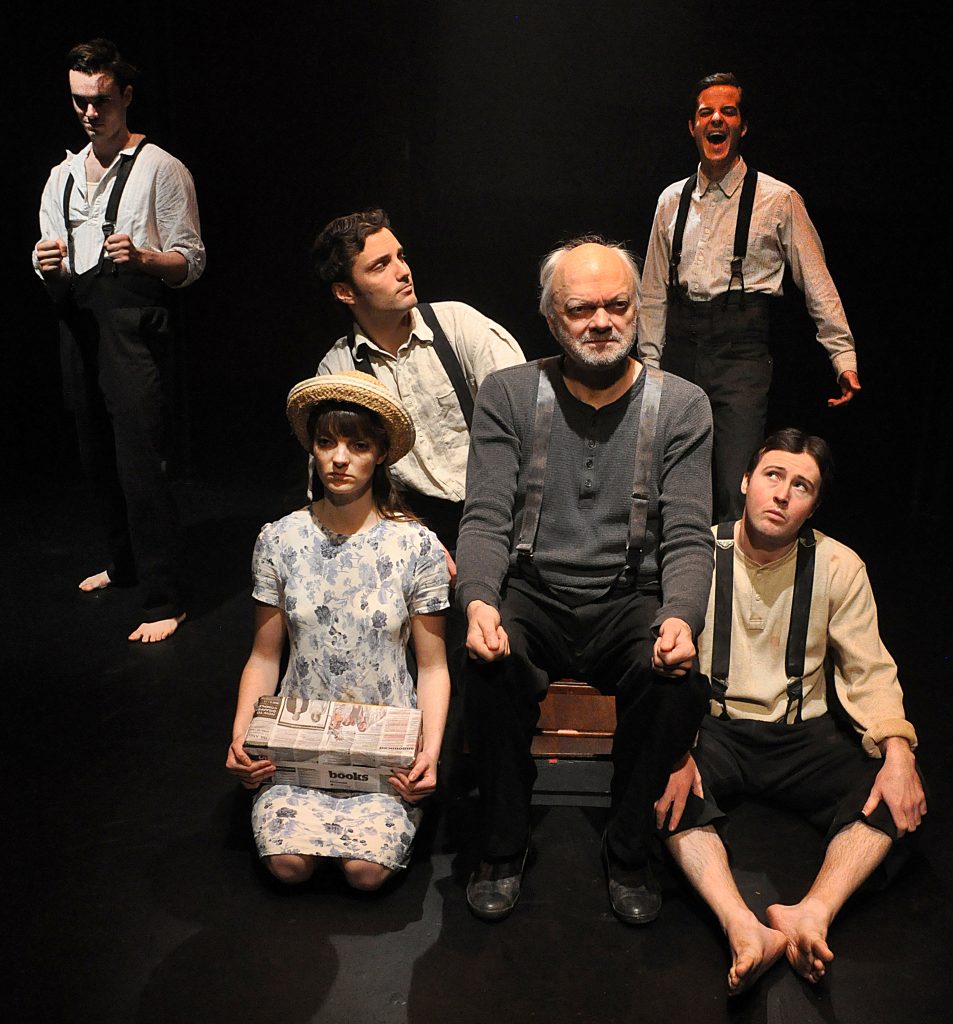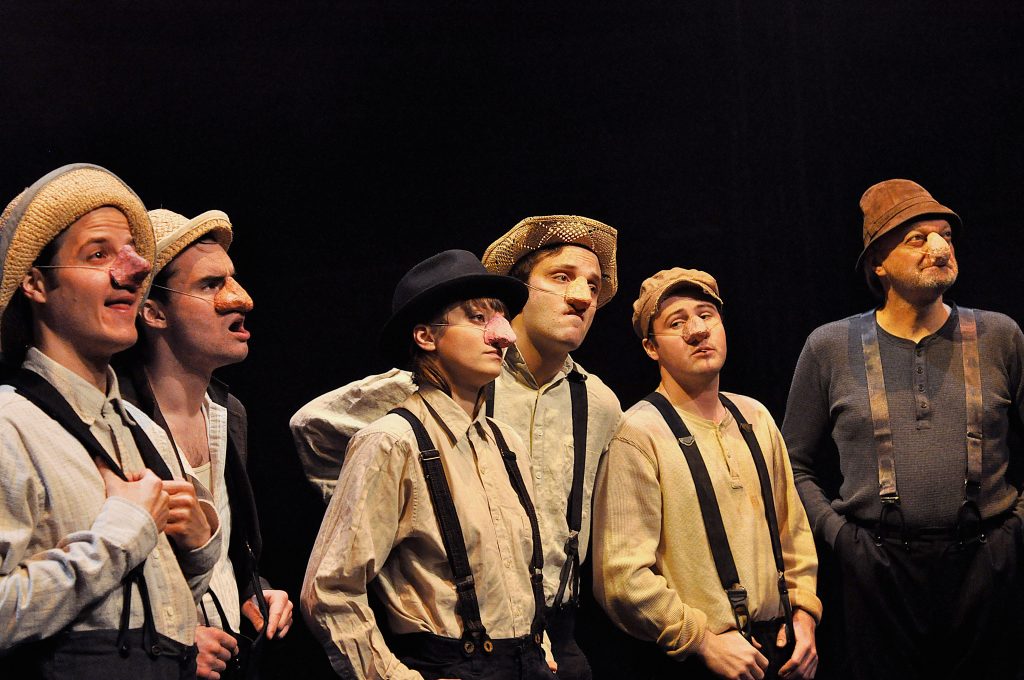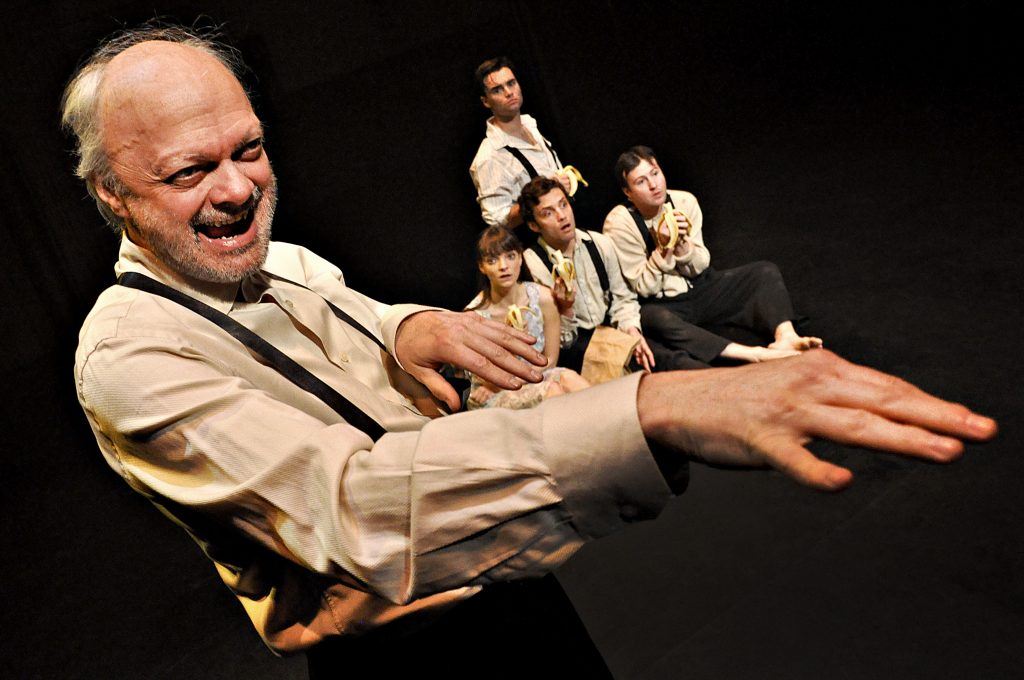
Credit: Katherine Fleitas
At Goldcorp Stage at the BMO Theatre Centre until February 12, 2017
604-687-1644/artsclub.com
Posted January 28, 2017
I don’t remember ever thinking William Faulkner spun good yarns. But that’s what Toronto’s Theatre Smith-Gilmour’s physical theatre adaptation of Faulkner’s novel is: a good yarn.
Act I is more like the Faulkner I remember: bleak, squalid stories of the Deep South in the 1930s with death, poverty, retardation and infidelity all in there. But, adapted from the novel by company founders Michele Smith and Dean Gilmour, Act II takes the Bundren family – father Anse and kids Darl, Dewey Dell, Cash, Jewel and Vardaman – on a wild wagon ride with the coffin of the recently-deceased (and rapidly decaying) family matriarch, Addie, in the back. Addie demanded to be buried in Jefferson, Mississippi, sixty miles away, with the rest of her kin.
In Act I, Addie breathes her last while her favourite son, Cash (Eli Ham), saws the coffin boards outside her window. She tells us – from beyond the grave – that she had little use for her other children or her husband. Nevertheless, they are all committed to getting her body to Jefferson, come hell or high water.

Credit: Katherine Fleitas
And that’s what they get. Storms, floods, washed-out bridges, drowned mules, heat (with the smell of Addie rotting) and a spectacular barn fire.
Co-artistic directors Michele Smith and Dean Gilmour are Jacques Lecoq-trained performers so, naturally, their adaptation of Faulkner’s novel uses mime and, to a lesser extent, clowning. Minimal props. Barefeet. Some fake noses. But there’s lots of text, too, and it’s delivered with deep southern (sometimes hard-to-understand) accents. Addie (Michele Smith) has such a strong French accent that it’s easy to miss very important plot points. In one of the most entertaining reviews I’ve read, National Post critic Robert Cushman had this to say (in the vernacular of the Bundren family): “She [Addie] says too that she and the local preacher sinned together and how guilty she feels about it. Least she says that in the book. It isn’t in the play, indeed nearly all the vital stuff about religion and redemption and damnation has got lost in transit, and having spirituals sung offstage don’t make up for it.”
But what is extraordinary in this Theatre Smith-Gilmour/Arts Club Theatre/PuSh International Performing Arts Festival production is the gorgeous physicality of the work. Benjamin Muir plays both Jewel and Jewel’s spirited, bucking, lunging, whinnying horse. It’s a remarkable performance that leaves no doubt that there’s a horse – and a wild one at that – on stage. Scenes of the family swimming for their lives in a raging river or simply bumping along in the old wagon are amazingly realized.

Credit: Katherine Fleitas
Dean Gilmour, as the father Anse, is the kind of miserable old cuss you love to hate. He’d rather squander money – and waste precious time – spending money on floozies in the bar than call a doctor for Cash’s broken leg. And the ten bucks he spends on women and booze he has taken from daughter Dewey Dell (Nina Gilmour), unmarried, pregnant and hoping to buy something from a drugstore to end the pregnancy.
Darl (Julian De Zotti) is daft; Vardaman (Daniel Roberts), the youngest, thinks – by a convoluted string of extremely illogical thinking – that his mother might be a fish and he drills holes in her coffin so she can breathe. Not highly skilled with a drill, he manages to drill a couple of holes into her face.
It’s difficult to say what tone Smith and Gilmour hoped to strike. Are we laughing at or weeping for this family? Despite the levity of Act II, the future of Faulkner’s fictionalized Yoknapatawpha County folk looks grim: a bastard child on the way, one of the boys jailed, another with a leg that will probably never work again, a goofy child with a tenuous grasp on reality and a “new mom”. Do we care? Not enough.

